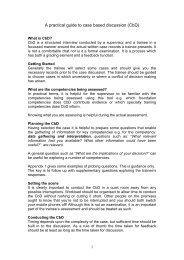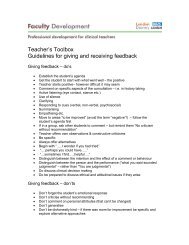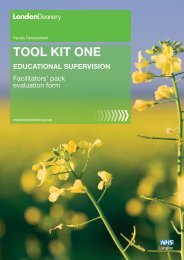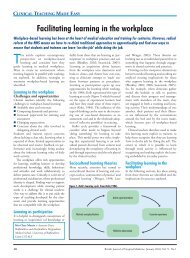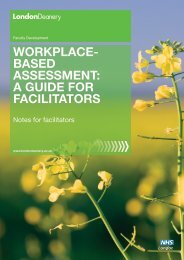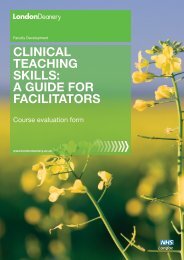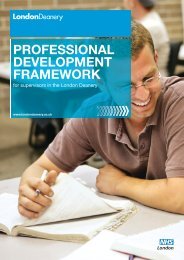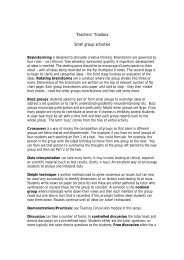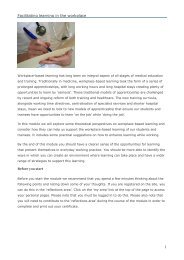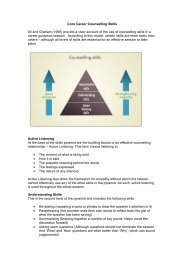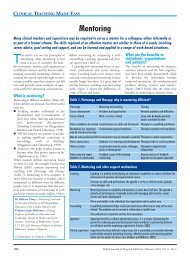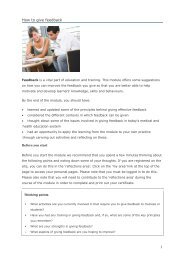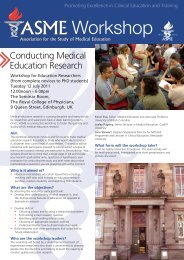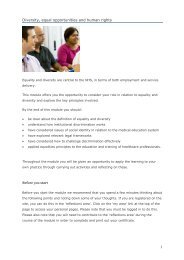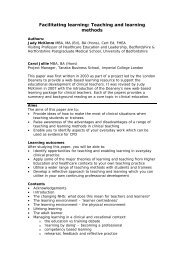Curriculum development module - Faculty Development - London ...
Curriculum development module - Faculty Development - London ...
Curriculum development module - Faculty Development - London ...
You also want an ePaper? Increase the reach of your titles
YUMPU automatically turns print PDFs into web optimized ePapers that Google loves.
standards or requirements include guidelines (eg. the General Medical Council’s<br />
recommendations on undergraduate medicine “Tomorrow’s Doctors”, 1993,<br />
2002), standards (eg. those produced by the National Boards for Nursing and the<br />
UKCC [now the Nursing and Midwifery Council]) or a syllabus/learning outcomes<br />
(eg. those produced for postgraduate medical education) which curriculum<br />
planners should use as templates or checklists when designing their courses or<br />
teaching sessions.<br />
The teachers’ toolkit item Steps in large-scale curriculum <strong>development</strong> is<br />
useful if you are interested in large scale curriculum reform.<br />
More recently in the UK, benchmarking standards have been produced in all<br />
subject disciplines, these specify curriculum aspects which should form part of<br />
higher education programmes at undergraduate level and against which<br />
‘inspections’ or academic reviews and institutional audits will be carried out.<br />
The linked paper Evaluating Teaching and Learning sets the UK educational<br />
quality context and describes national initiatives in more detail.<br />
As well as understanding the context in which the students or trainees are<br />
learning, it is important that the teacher is aware of the educational needs of<br />
the learners. This means thinking about the needs of the learners both as a<br />
group and as individuals. When teaching a group of learners there are many<br />
issues to consider in terms of how a teacher’s style may influence the group,<br />
group dynamics, how to deal with quiet or disruptive students and how to utilise<br />
learning resources to best advantage.<br />
In medical education, as we have seen above, there has been a shift from a<br />
‘teacher as expert’ style of curriculum (which may utilise more didactic teaching<br />
methods such as lectures) towards more learner centred approaches.<br />
Learning activity and reflection<br />
What do you think we mean by learner centred?<br />
What activities would be more appropriate to this sort of learning?<br />
My thoughts<br />
By learner centred we mean taking the needs of the learners into account rather<br />
than the needs of the teachers or administrators. This means thinking about<br />
issues such as gender, background and previous experience or education of the<br />
learners, learning styles, barriers to learning such as dyslexia or other disability,<br />
etc.<br />
Activities should be varied, designed to enable people to contribute, allow active<br />
participation in learning sessions, ensuring equal access to facilities, etc.<br />
This shift reflects work done by people such as Brookfield and Ramsden who<br />
identify specific differences between the way in which adults and children learn.<br />
The main characteristics of adult learning are:<br />
• the learning is purposeful



